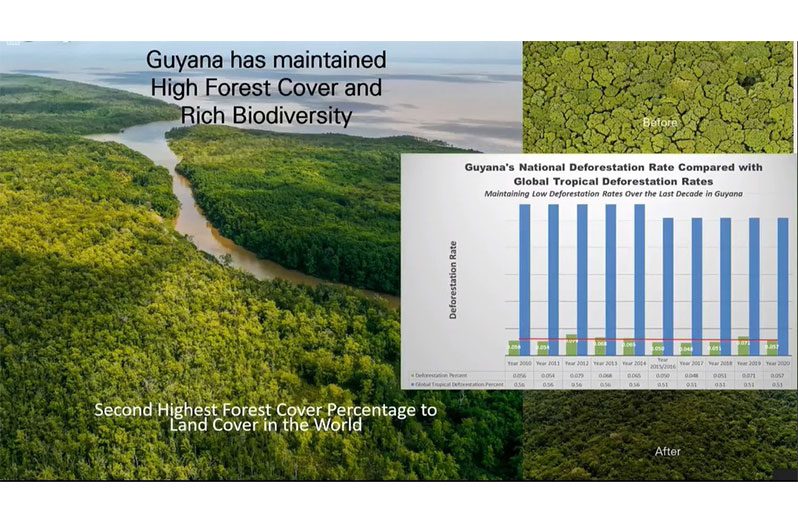–President Ali says, continues to lobby for forest payments
THE forest remains a critical component in the fight against climate change, and massive support is required to conserve it, President, Dr Irfaan Ali has maintained.
He said, however, while global stakeholders are aware of this, there have not yet been many solid commitments to fund such efforts.
In view of this, President Ali continued to lobby for a structured mechanism to advance monetary support to fund conservation efforts.
The Head of State made a case to enhance efforts to conserve forests within the Caribbean and Latin American region, during a presentation at the Sixth Annual Security Challenges in Latin America Forum held at the Johns Hopkins University Bloomberg Centre, School of Advanced International Studies, last week.
During the frank discussion, the Guyanese Head of State said: “I would say there is tremendous commitment in words, in understanding that there is a value, but there is very limited movement towards developing a mechanism through which that, value is monetised.”
Guyana since 2007 has been lobbying for support to enhance conservation efforts of its forest and those of its neighbours that are a part of the Amazon Basin.
While Guyana has entered a voluntary market to preserve its forests, a structured mechanism could create a greater incentive for Guyana and other developing countries.
WHAT ARE CARBON MARKETS AND WHY ARE THEY IMPORTANT?
In a nutshell, carbon markets are trading systems in which carbon credits are sold and bought.
Companies or individuals can use carbon markets to compensate for their greenhouse gas emissions by purchasing carbon credits from entities that remove or reduce greenhouse gas emissions.
According to President Ali, the market is “not getting the type of reaction that it deserves.”
What is needed are frank discussions on decision making and policy making to acknowledge the value of forests by the already developed countries.
The value of forests, the Guyanese leader said, must be written in policy-making frameworks to support a market-based mechanism
In 2022, Guyana sold 37.5 million carbon credits for a minimum of US$750 million, to be paid during 2022-2032 (a third of the credits Guyana will receive over 2016-30); this is one of the largest transactions in the world.
More recently, Guyana made the world’s First Paris Agreement Corresponding Adjustment for ART-Issued TREES Carbon Credits, allowing for the authorisation of carbon units for use in the Carbon Offsetting and Reduction Scheme for International Aviation (CORSIA).
“We were one of the first countries to have an agreement with the Kingdom of Norway and then we had an end-user agreement with the Hess Corporation. We now are working on having another agreement. So, we have proven that the model can work although it’s a voluntary market, but we now have to move that on a global scale in a very structured market, and that is what we want to do. Work with everyone in bringing this,” the President said.
LACK OF WILL
According to President Ali, there is ‘lack of will’ to advance the carbon market and value forests.
“Whilst on one hand, the world is saying we must take these measures, we must adopt these policies, on the other hand there is no commitment when it comes to providing the resources. There is no commitment when it comes to valuing and monetising the assets that are key in keeping our planet alive,” he said.
Forests are arguably the earth’s greatest asset. According to the Guyanese leader, forests also provide a service.
He said: “In any society, in any economic structure model, you have to pay for that service. You have to pay for that service and that is why we believe that the time has come for this monetisation to be structured and to be compulsory. And that is what we are working [on], we are pushing ahead with.”



.jpg)











